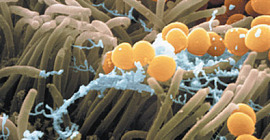
New findings may help improve nutritional supplements for treating age-related macular degeneration (AMD), the leading cause of blindness nationwide.
AMD gradually destroys sharp, central vision as a person ages. The disease affects the macula, a region of the retina responsible for central vision. We rely on the macula for tasks that require sharp vision, such as reading, driving and recognizing faces. Some kinds of AMD are treatable if detected early, but no cure exists. About 2 million Americans have advanced AMD.
The Age-Related Eye Disease Study (AREDS), which was led by NIH’s National Eye Institute (NEI) and concluded in 2001, found that daily high doses of vitamins C and E, beta-carotene, and the minerals zinc and copper can help slow the progression to advanced AMD. However, beta-carotene use has been linked to lung cancer in smokers. The high zinc dose in the AREDS formulation may also cause minor side effects, such as stomach upset, in some people.
In 2006, NEI launched AREDS2 to test whether the AREDS formulation could be improved by adding omega-3 fatty acids; adding lutein and zeaxanthin; removing beta-carotene; or reducing zinc. Omega-3 fatty acids are produced by plants, including algae, and are found in oily fish such as salmon. Lutein and zeaxanthin are carotenoids, a class of plant-derived vitamins that includes beta-carotene. Past studies suggested that diets high in lutein, zeaxanthin, and omega-3 fatty acids protect vision. Before the AREDS2 study finished, manufacturers began including them in supplements.
Get The Latest By Email
The investigators enrolled more than 4,000 people between 50 and 85 years old who were at risk for advanced AMD. Participants were assigned to take 1 of 4 formulations daily for 5 years: the original AREDS, AREDS with no beta-carotene, AREDS with low zinc, or AREDS with no beta-carotene and low zinc. Participants in each group also took 1 of 4 supplements or combinations: lutein/zeaxanthin, omega-3 fatty acids, lutein/zeaxanthin and omega-3 fatty acids, or an inactive placebo.
Adding omega-3 fatty acids or lowering zinc had no effect on AMD progression. However, the investigators did find some benefits in the lutein/zeaxanthin mixture for those not given beta-carotene and those who had very little lutein and zeaxanthin in their diets. The lutein/zeaxanthin mixture was also safer than beta-carotene for smokers.
 We have identified a formulation that should be good for everyone regardless of smoking status,” says co-author Dr. Wai T. Wong of NEI.
We have identified a formulation that should be good for everyone regardless of smoking status,” says co-author Dr. Wai T. Wong of NEI.
AREDS2 investigators also reported on the effects of these formulas on cataract, a clouding of the eye’s lens that is common in older people. Like the original AREDS formulation, none of the modified treatments had a significant effect on progression to cataract surgery. However, participants with low dietary lutein and zeaxanthin did seem to gain some protection.
Many factors contribute to the development of AMD and cataract, including genetics, diet and smoking. While scientists are still unsure how supplements in the AREDS formulation exert their protective effects, these results will aid efforts to prevent vision loss from AMD.
- http://www. nih. gov/researchmatters/march2013/03112013macular.
- http://www. nih. gov/researchmatters/april2010/04192010eye.
- http://www. nih. gov/researchmatters/may2012/05072012vision.
- http://www. nei. nih. gov/health/maculardegen/index.
- http://www. nei. nih.
2013 May 5:1-11. doi: 10. 1001/jama. 2013. 4997. Epub ahead of print]. PMID: 23644932.
2013 May 5:1-7. doi: 10. 1001/jamaophthalmol. 2013. 4412. Epub ahead of print]. PMID: 23645227.
NIH’s National Eye Institute (NEI), National Institute of Neurological Disorders and Stroke (NINDS), National Institute on Aging (NIA), National Heart, Lung and Blood Institute (NHLBI), National Center for Complementary and Alternative Medicine (NCCAM) and Office of Dietary Supplements (ODS).










